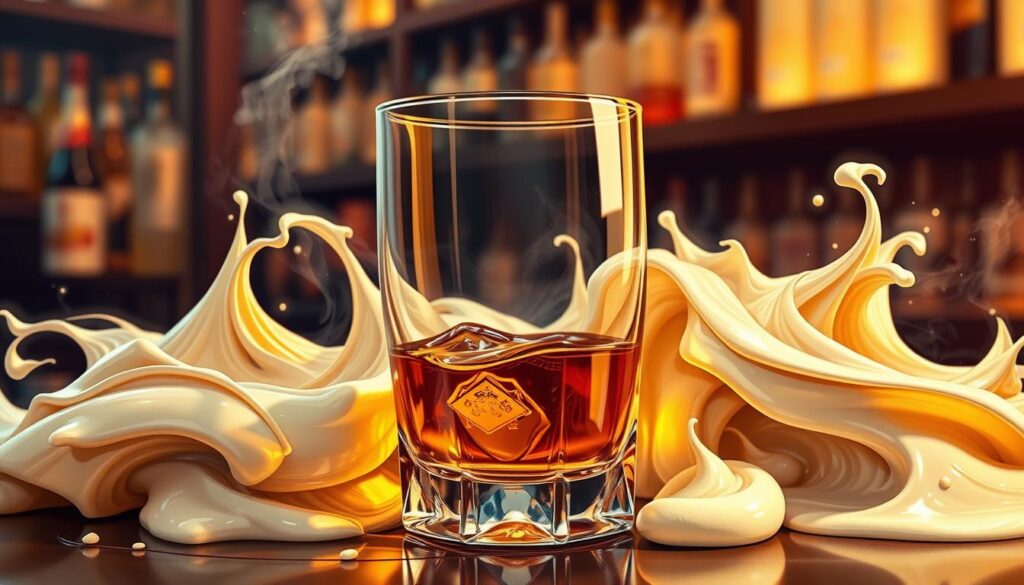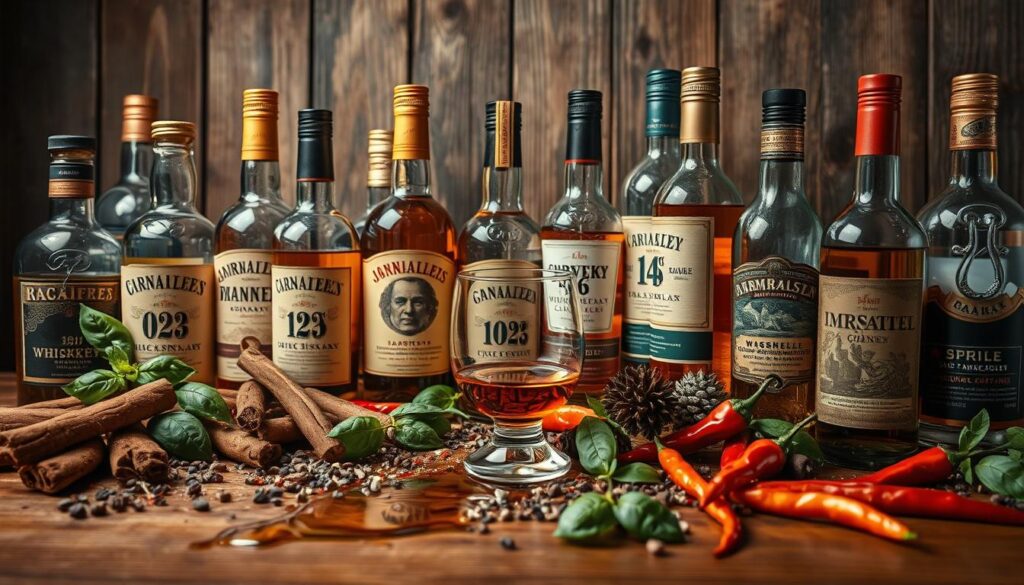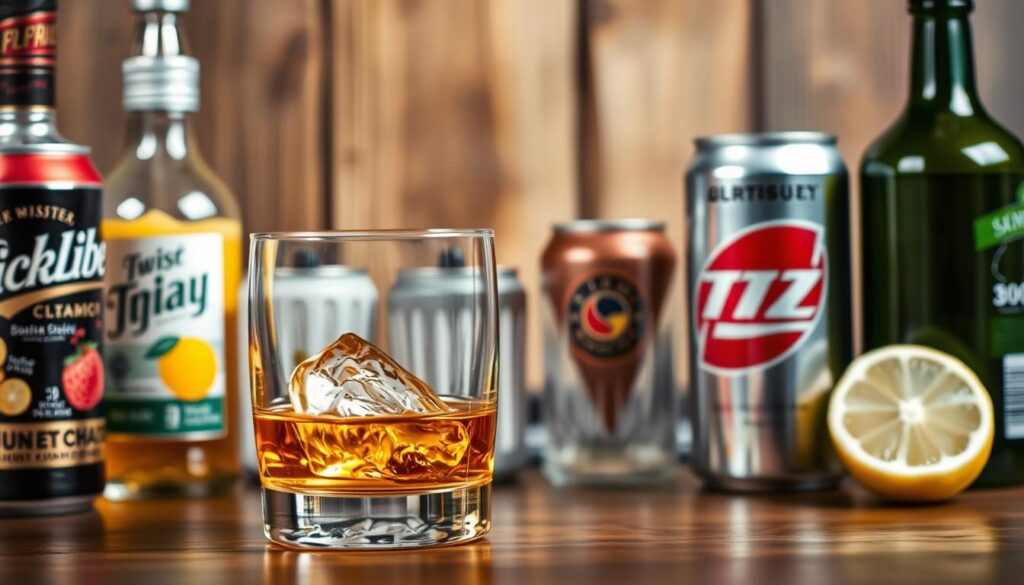Whiskey lovers know that a great pour deserves respect, but what if your choice of mixer sabotages the magic in your glass? Whiskey cocktails can be thrilling, but not every ingredient pairs well with this storied spirit.
Some mixers clash with its robust profile, leaving you with a drink that feels unbalanced and, frankly, disappointing. Understanding what not to mix with whiskey can save your taste buds and your bottle from disaster.
Get ready to uncover the ultimate list of whiskey no-nos, so you can savor every sip with confidence and style. Let’s start!
Understanding Whiskey Types and Flavors
Whiskey comes in various types, each offering distinct flavors and characteristics:
- Bourbon: An American favorite, made from at least 51% corn mash and aged in new charred oak barrels. Its sweet, vanilla flavor makes it a versatile base for many cocktails.
- Rye Whiskey: Crafted with a minimum of 51% rye mash, it delivers a spicier, bolder taste — perfect for cocktails with a kick.
- Scotch Whisky: Made primarily from malted barley and aged for at least three years in Scotland, it is popular for its peaty, smoky profile.
- Irish Whiskey: Known for its smoothness, it often uses unmalted barley, creating a lighter, approachable flavor.
Understanding these differences is essential for crafting well-balanced whiskey cocktails that highlight the unique traits of each type. Exploring the charms of American whiskey, as well as Scotch and Irish varieties, can help you discover new favorites and avoid mismatched pairings.
Common Mixers Often Used With Whiskey
Whiskey enthusiasts often experiment with mixers to discover new and complementary flavors:
- Ginger Beer and Lime: A popular choice that adds a spicy, zesty twist.
- Vermouth and Bitters: The classic ingredients for a Manhattan, offering a rich and timeless taste.
- Water: A simple addition that can open up the whiskey’s flavors and enhance its complexity.
- Citrus Juices: Lemon juice creates a refreshing Whiskey Sour, while orange juice can brighten up certain blends.
- Seasonal Twists: Apple cider and maple syrup are perfect for cozy, autumn-inspired cocktails.
Classics like the Old Fashioned and Blood and Sand are excellent starting points for those exploring whiskey cocktails. The key is to choose mixers that complement and enhance the whiskey’s natural flavors, ensuring the spirit remains the star of the drink.
What To Avoid When Mixing Whiskey
Whiskey is a complex and refined spirit, with flavors that vary from smoky and peaty to smooth and sweet. To truly appreciate its richness, it’s important to be mindful of what you mix it with.
While experimenting with different ingredients can be fun, some combinations can overwhelm or mask the unique characteristics of whiskey. Here are common mixing mistakes to avoid to ensure your whiskey shines in every sip.
1. Energy Drinks
Mixing energy drinks with whiskey is a big mistake. It can cause serious health problems. The caffeine in energy drinks can hide the effects of alcohol, leading to too much drinking.
A study with 44 young adults showed that one energy drink lowered blood vessel size. This is bad for blood flow. Adding alcohol to this mix makes things worse. American whiskey lovers need to watch out for this combo.
The FDA has warned about pre-mixed drinks with alcohol and caffeine. In 2010, they sent warnings to several companies. They said these drinks were dangerous because caffeine could hide how drunk someone is. This led to bans in some places, like Washington.
Studies show mixing energy drinks with alcohol can lead to bad outcomes. These include sexual assault, injuries, and needing medical help. It also makes people more likely to do risky things, like driving drunk.

2. Cream Liqueurs
Mixing whiskey with cream liqueurs might seem tempting, but it’s a common mistake. Cream liqueurs, with 15% to 18% alcohol, can mess up the texture. This mix often leads to an unpleasant mouthfeel or even curdling, especially with acidic ingredients like coffee or juice.
The sweet flavors of cream liqueurs can also overpower whiskey’s subtle notes. This makes for a less enjoyable tasting experience. It’s a mix that whiskey fans should avoid. While cream liqueurs are tasty on their own, they’re not good with whiskey.
Also, cream liqueurs have lots of added sugar, like sodas or candy. Drinking them regularly can cause weight gain and health problems like heart disease and high blood pressure. For those who love whiskey, it’s better to avoid cream liqueurs and try other mixing options.
3. Sweetened Mixers
When exploring what not to mix with whiskey, sweetened mixers top the list. These sugary drinks can mask whiskey’s complex flavors, resulting in a poor cocktail. A 32-ounce bottle of sweet and sour mix, for example, contains enough sugar to overpower whiskey’s taste.
Many sweetened mixers also include artificial flavors and preservatives. A 16-ounce bottle of citrus agave mix might contain additives like acacia gum and sodium hexametaphosphate, which can ruin whiskey’s natural flavor.
Instead of relying on cheap sweet and sour mixes, consider alternatives. Craft mixologists often use small 8-ounce bottles of natural syrups made with pure cane sugar and real fruit juices. These enhance whiskey’s taste without overwhelming it.
The goal is to complement whiskey’s flavors, not mask them. By avoiding sweetened mixers, you’ll better appreciate the true character of your whiskey in cocktails.

4. Spices and Herbs
Spices and herbs can add exciting flavors to whiskey, but not every ingredient complements its complex taste. Start with small amounts and adjust to taste to avoid bad flavor combinations.
When infusing whiskey, use organic ingredients and ensure the whiskey is at least 45% ABV for optimal flavor extraction. Most infusions take three to six days. Adding spices and whole nuts can enhance their flavor.
Safe choices include cinnamon, nutmeg, or a dash of bitters. For classic combinations, try whiskey with a cinnamon stick or citrus peel. Start with an 8-ounce infusion using a 1:1 ratio of whiskey to your mixture, tasting as you go.
For herbs, fresh is best. Freeze-drying delicate leaves like mint or basil can preserve their flavor. To avoid muddled tastes, infuse ingredients separately and blend later to your preference. Mason jars provide an affordable and effective way to infuse whiskey.

5. Excessive Ice
Ice can be a friend or foe when it comes to whiskey. Too much ice can dilute your spirit, making it taste less rich. This is especially true for barrel-proof whiskeys, which can be up to 135 proof.
The key is moderation: one large ice cube or two to three smaller ones are usually enough. Crystal-clear ice spheres melt slower, keeping the whiskey’s flavor intact. Some prefer whiskey stones or chilled glasses to cool their drink without dilution.
When deciding what not to mix with whiskey, remember that ice affects different whiskeys differently. Cask-strength and younger whiskeys might benefit from a bit of ice. But it can over-oak bourbons older than 15 years. It’s wise to taste your whiskey neat before adding ice.
In the UK, ordering a single malt “on the rocks” might get you strange looks. A Swedish study found that some dilution opens up more flavor compounds in whisky.
The Scotch whisky industry often dilutes samples to 20% ABV for flavor analysis. So, while ice has its place, moderation is key to fully appreciating your whiskey’s complex flavors.
Cocktails: When Mixing Is Acceptable
While purists might avoid mixing whiskey, certain cocktails are exceptions. Classics like the Old Fashioned, Manhattan, and Whiskey Sour showcase the spirit’s flavor, proving mixers can enhance whiskey when balanced correctly.
Club soda and seltzer add fizz without overshadowing whiskey, while tonic water’s quinine can reveal hidden flavor layers. For something unconventional, try a “pickleback” with pickle brine for a savory twist or cranberry and grapefruit juice for tartness. Even coconut water can add a tropical touch to scotch.
Consider the whiskey’s character when crafting cocktails. Spicy rye whiskies like Rittenhouse or Bulleit elevate Manhattans, while smooth bourbons like Maker’s Mark shine in mint juleps. Using quality ingredients is essential to create enjoyable whiskey cocktails. With the right mix, whiskey can offer a world of flavors to explore.

Bitters: Elevating Your Whiskey
Bitters can enhance whiskey’s flavor and elevate your drink. Angostura bitters are a classic, but orange or cherry bitters are excellent alternatives. Start with a small amount and adjust to taste, as overdoing it can overpower the whiskey.
Pair bitters with the whiskey’s character. Spicy rye complements orange bitters, while smooth bourbon pairs well with cherry bitters. Choosing the wrong bitters can disrupt the balance. Excessive bitters can overwhelm strong whiskeys, while lighter ones benefit from the added complexity.
The Old Fashioned exemplifies how bitters can transform a simple drink into something refined. Experiment with different bitters, but focus on complementing, not masking, the whiskey’s flavor. With practice, you’ll discover the perfect balance for your palate.
Cheers to Mastery: Perfecting Whiskey Mixes One Sip at a Time
Discovering the perfect whiskey mix is a delightful journey for enthusiasts. Mixologists often emphasize that you don’t need the most expensive whiskey to craft a great cocktail. Mid-range options like Rittenhouse Rye ($25–$35) can deliver exceptional results, rivaling pricier alternatives.
Whiskey preferences are deeply personal. Some savor it neat, others prefer it on the rocks, and many love experimenting with cocktails. The key is to explore and find what brings you the most enjoyment.
A splash of water can also transform your whiskey, enhancing its flavors and making it more approachable. Whether you’re sipping a Russell’s Reserve 6 Year or an Old Forester, the ultimate goal is to relish the experience.
Ready to elevate your whiskey knowledge? Explore expert tips on pairing whiskey with the right flavors and savoring its unique profiles on Scotland Whisky. From avoiding common mistakes to mastering insider tricks, our guides are your gateway to the world of Scotch whisky.
Visit Scotland Whisky today for detailed reviews, tasting notes, and expert advice. Cheers to enhancing your whiskey journey!